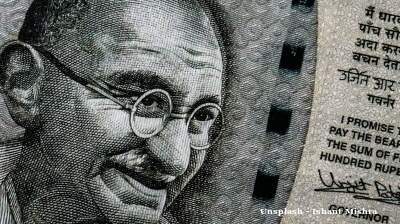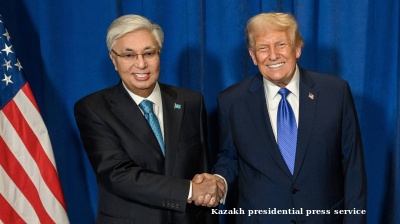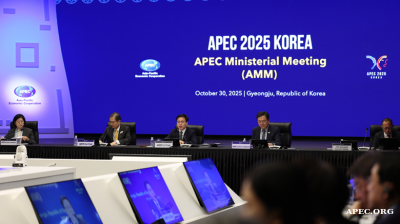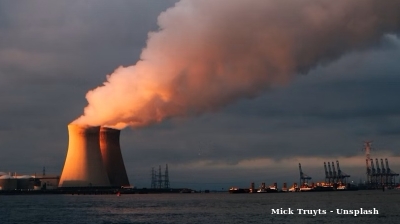LONG READ: How Iran’s “Shadow Commander” Qasem Soleimani left home at 13 and took a stranglehold on the Middle East

Sometimes referred to as the “Shadow Commander”, Qasem Soleimani is much more than a feared major-general who rose from humble origins to become the mastermind that—a military thinktank concluded this week—has orchestrated an effective military advantage over the US and its allies in the Middle East.
Born in 1957 into a farming family in southeastern Iran and forced by poverty to leave home at the age of 13 in search of work, Soleimani has for many years, say some observers, essentially served as Iran’s ‘foreign minister’ for the region, especially when it comes to war-torn Iraq, Syria, Lebanon and Yemen. That much was brought home this week when the UK’s International Institute for Strategic Studies (IISS) released a highly detailed 217-page assessment of the strategy and doctrine Iran has exercised towards these four countries, prompting Jack Straw, the UK's foreign secretary from 2001 to 2006, to reflect that Soleimani's role goes well beyond that of a military commander.
"Qasem Soleimani has basically been running their [Iran’s] foreign policy in the region through alliances backed by force," he told the BBC.

Special units of Iran's Revolutionary Guard have over the years been quietly deployed across Iraq and Syria. (Credit: Tasnim).
Text message to Petraeus
The IISS analysis, entitled “Iran’s Networks of Influence”, tells how in 2007 and 2008 Iraqi officials served as intermediaries between US commander General David Petraeus and Qasem Soleimani (sometimes spelt Qassem Suleimani). The elusive Soleimani, now 62, who commands the Quds Force of Iran’s Islamic Revolutionary Guard Corps (IRGC), which is responsible for Iranian military operations abroad, sent four-star general Petraeus the following text message: “General Petraeus, you should know that I, Qassem Suleimani, control the policy for Iran with respect to Iraq, Lebanon, Gaza, and Afghanistan. And indeed, the ambassador in Baghdad is a Quds Force member. The individual who’s going to replace him is a Quds Force member.”
In 2010, Petraeus told a thinktank, the Institute for the Study of War, about the problem Suleimani created for him: "Now, that makes diplomacy difficult if you think that you're going to do the traditional means of diplomacy by dealing with another country's ministry of foreign affairs because in this case, it is not the ministry. It is a security apparatus."
Soleimani is renowned for giving sometimes bone-chilling anti-US foreign policy speeches. He was in the news in July last year when he squared up to US President Donald Trump, mocking the threats the American Commander-in-chief had lately made to Iran on Twitter, likening him to a gambler and nightclub owner and deriding the performance of US armed forces in Afghanistan.

Soleimani giving a speech last year.
Addressing an audience in Iran’s western city of Hamedan, Soleimani said Trump should know that the Islamic Republic would be the one to “end” any war between their two countries, adding: “I’m telling you, Mr Trump the gambler, I am telling you: know that where you are not thinking of, we are near you. Places you cannot imagine, we are next to you.”
He went on: “We, the Iranian nation, have gone through tough events. You may begin a war, but it is us who will end it. Go ask your predecessors about it. So stop threatening us. We are ready to stand up against you. The Red Sea which was secure is no longer secure for the presence of American [military]... The Quds force and I are your match. We don’t go to sleep at night before thinking about you.”
Designated an FTO
In April, Trump took the unprecedented step of designating the IRGC, including the Quds Force, a "foreign terrorist organisation" (FTO). It was the first time the US had named a part of another government as an FTO. Iran responded by designating the US military in the Gulf region (which comes under US Central Command, or Centcom) as a terrorist entity, a largely symbolic gesture.
Just over a month ago Soleimani was again in the headlines—though largely only in Iran—when a top Iranian official said Tehran had foiled a plot by Israeli and Arab agencies to assassinate him by buying a property adjacent to the grave of his father and rigging it with explosives to be detonated during a visit to the spot by the commander.
The IISS report makes the case that while Iran’s Middle East adversaries, such as arch-rival Saudi Arabia, have spent billions on Western weaponry, Iran has, for a fraction of the cost, been able to use alternative strategies to embed itself across the Middle East into a position of strategic advantage. Soleimani, it seems, has successfully managed the leveraging of Iran’s ability to wage war using third parties such as Shia militias and insurgents. Indeed, so successful has the strategy been that a spokesman at the Iranian embassy in London could hardly hide his pride when the analysis was published, telling reporters: "If the report means that Iran's role in its region should be respected, it is a welcome sign. The policy of ignoring Iran did not work. Iran resisted. Iran has also successfully controlled damages of US economic terrorism [in the form of crushing sanctions]. So yes, it is a powerful nation and has a lot of relations with other nations with a lot of initiatives for regional co-operation."
Job in municipal water department
Chapter one of the report tells how after leaving his poverty-stricken home as a teenager to find work, Soleimani found employment in the municipal water department in Kerman, southeastern Iran. “He played no part in the 1979 [Islamic] revolution, and his first role in the [1980-88] war with Iraq was to ensure the delivery of water to front-line soldiers,” the report says. “As the conflict attrited Iran’s cadre of officers, Soleimani was moved to a battlefield position and here—despite an absence of military or indeed much formal education—he thrived and enjoyed a reputation for bravery. His early military career included the suppression of Kurdish uprisings along Iran’s northwest border with Iraq and participation in the Iran–Iraq War’s major battles.”
After the war, Soleimani was appointed commander of an IRGC division tasked with suppressing unrest and narcotics trafficking along Iran’s eastern border, the report adds. “Tehran’s tensions with Taliban-ruled Afghanistan increased soon after he assumed this assignment. In August 1998, the Taliban captured and later killed Iranian diplomats and a press correspondent, and a war was only narrowly averted.
“Soleimani would likely have been active during this time working with sources within the Taliban community on the status of the captured Iranians, negotiating their return, and participating in any Iranian military planning for an attack on Afghanistan. During this same period, Soleimani maintained the Quds Force relationship with Lebanese Hizbullah and expanded training facilities in Lebanon and Sudan.”
Resolving factional disputes
The analysis also tells how by 2011, Iran’s influence over Baghdad’s political, security and media architecture was significant. “The Quds Force ensured that it had sufficient funds, weapons and political guidance to be successful and those who opposed Iran’s interests were either side-lined or threatened into compliance. Soleimani played an increasingly open role in Iraq’s political process, resolving factional disputes among the Iranian militias and Muqtada al-Sadr, as well as seeking the election of Nouri al-Maliki as prime minister, who was considered sufficiently compliant that he would neither challenge Shia militia influence nor aggressively oppose Iran’s activities in Iraq.”

An Iranian Revolutionary Guard commando. (Credit: Tasnim).
The Iraqi conflict, it seems, helped to transform the role and stature of the Quds Force. Soleimani’s relationship with Iranian Supreme Leader Ayatollah Ali Khamenei, who assumed office in mid-1989, considerably deepened during this period.
“As a result, the Quds Force’s domination of Iran’s policy in Iraq stood in stark contrast to the limited role played by Iran’s foreign ministry, especially as the Quds Force assigned its senior officers as Iran’s ambassadors to Baghdad. A new generation of the Quds Force cadre acquired valuable experiences in working with Arab militias against Western forces in Iraq and saw that they could undertake indirect threats against them without incurring any direct response against Iran,” the report adds.
The rise and dramatic initial success of Islamic State (aka ISIS or ISIL) in June 2014 “compelled Soleimani to play a more significant role in the direction of Iraqi militias in combat to sustain Iraqi allies, and to prevent the collapse of Iraq and establishment of an ISIS state on Iran’s western border”.
The report tells how “Iran transferred hundreds of advisers to the Iraqi government, shipped tonnes of weapons to the Kurds and recalled Shia militias from Syria to confront ISIS forces, which seemed at one point close to threatening Baghdad. In an unprecedented example of its new regional assertiveness and willingness to operate militarily near Western forces, Iran provided close air support to Kurdish Peshmerga forces, Badr Organisation militia forces and Iraqi special-operations units. The operations also enabled Iran to test indigenous guided ordinance.”

Soleimani this year received Iran's highest military honour, the Order of Zolfaghar, from Supreme Leader Ali Khamenei. (Credit: Khamenei.ir),
The IISS analysts, who spent 16 months researching and compiling their assessment, also reflect how the Syrian conflict served as a powerful test of Iran’s external military doctrine. “The conflict demands were a mirror opposite to those in Iraq between 2003 and 2008. In Iraq, the Iranians used insurgents to attack the regular US Army; in Syria, Soleimani would need to bolster a regular army fighting against multinational insurgents supported by the US.
“As in Iraq, the Quds Force took the lead, shaping Iran’s operations to protect Shia shrines from Sunni militants and to sustain the Assad regime itself. Within months, the Quds Force would also see the war as an indirect conflict against the Gulf states and the US.”
By early 2013, Iran’s involvement in the Syrian conflict appeared to be only slowing what then seemed to be the inevitable collapse of the Assad regime, observe the research institute authors, adding: “Iran responded with four initiatives. Firstly, Soleimani discouraged Assad from confronting opposition forces throughout Syria and instead urged him to stabilise the southern and western fronts, which were most important to the regime’s survival. Secondly, the Quds Force undertook a reorganisation of Syria’s various paramilitary forces into a new 50,000-strong unit called the National Defence Forces (NDF). Thirdly, Iran increased the number of Lebanese Hizbullah and Iraqi militia forces in the country. Members of Iraq’s Asaib Ahl al-Haq, Badr Organisation and Kataib Hizbullah (named collectively the Haidariyoun) soon highlighted their Syrian operations on social media.
“Finally, Iranian Foreign Minister Mohammad Javad Zarif undertook an aggressive diplomatic campaign that criticised US and Sunni involvement in the conflict, while simultaneously urging a political settlement with the opposition that would keep Assad in power and Iran’s interests intact. Iran was excluded from peace talks in Geneva, but its diplomatic voice on Syria was growing.”

Soleimani praying with fighters in the Syrian desert near the Iraq border in 2017. (Credit: Tasnim)
Battle for Qusayr
On 19 May 2013, Iran joined Syrian forces in a major battle to capture the city of Qusayr, which had been under opposition control since early in the conflict.
The report describes how “restoration of government control was an essential element in the Quds Force’s strategy: the city enjoyed a strategic location, sitting along the supply route for opposition forces in Homs, as well as splitting Damascus from Assad’s traditional Alawite stronghold on the Syrian coast. The city also sits near the entrance to the Bekaa Valley, the traditional channel for Iran’s movement of personnel and weapons to Lebanese Hizbullah.
“Soleimani reportedly took personal charge of a large body of Lebanese Hizbullah, NDF, Quds Force and Syrian military personnel in the battle. After severe fighting, the city fell to Assad’s government on 5 June. By the end of 2013, Iran’s increasingly dominant role in directing Syrian battlefield operations was widely known, and opposition elements began to claim that Soleimani had more power in Syria than Assad.”
Soleimani’s battlefield weaknesses in Syria included a lack of combat air support, advanced artillery, missile coordination and sophisticated special-operations partners, the analysis says. Explaining how Russia came into the war, it adds: “Given Moscow’s long history in Syria, President Vladimir Putin’s animosity towards US President Barack Obama, concerns that the Arab Spring would diminish Russian regional influence and Russia’s traditional lack of objection to Iran’s activities in Syria with Hizbullah, Russia was an obvious choice [for Iran to approach].
“Such an expansion of Russo-Iranian military cooperation would be a dramatic shift in what had been a complicated historical relationship. The years following the collapse of the Soviet Union witnessed deepening relations. Moscow’s willingness to sell Iran weapons and nuclear technology, and Russian support for Iran at the UNSC [United Nations Security Council], as well as its attempts to build a relationship with Iranian President Mahmoud Ahmadinejad, gradually made Russia seem less hostile.
“In July 2015, Soleimani flew to Moscow and met President Putin to negotiate joint military involvement in the conflict. On 30 September, Russia’s parliament approved Putin’s request to launch airstrikes in Syria. Russia’s presence and the intensity of its operations quickly escalated.”
Lack of international reaction
The lack of international reaction to Iran’s adventurism resulted from a mixture of crisis fatigue, competing priority issues, a decline in direct US involvement in the region and Russian obstructionism in the UNSC, the report contends. “But Iran’s willingness to undertake an assertive foreign policy to exploit fissures in the international community did deflect pressure from Tehran, allowing the Quds Force to create facts on the ground. This foreign policy has been directed by the Supreme Leader but dominated by two actors: Major-General Soleimani, who engaged directly with Iraqi, Russian and Syrian leaders, and Iran’s Foreign Minister Zarif, who focused on communicating with the broader international community.”
The report observes that in Soleimani and Zarif’s “engagement with foreign officials… despite differences in style and personality, they displayed common qualities”. They are listed as:
· Both represent Iran’s incoming generation of leaders: assertive, pragmatic and committed to the revolution’s principles. They are unwilling to compromise on Iran’s claimed role as a regional hegemon, and are committed to the sustenance of the Axis of Resistance against Israel and the need for the US to leave the region.
· Each has relied on powerful patrons, whom they are likely to influence. Soleimani’s ties to the Supreme Leader are as well known as Zarif’s relationship with President Hassan Rouhani. Soleimani is likely to survive under future hardline supreme leaders, but Zarif’s position may not survive the end of Rouhani’s term in 2021.
· Their stature is in part due to their longevity. Soleimani has led the Quds Force since 1998 and had considerable experience with Afghan and Kurdish issues before taking command. Zarif became foreign minister in 2013, before which he had periodic interaction with US officials and long service at the UN.
· Their status has been elevated by significant US foreign-policy decisions: Soleimani’s operational world burgeoned after the US-led invasion of Iraq; for Zarif, the Joint Comprehensive Plan of Action nuclear deal provided unprecedented engagement with China, Russia, the US and major European leaders.
· Each has been the target of Western outreach. Zarif used the discussions to build a working relationship with the US secretary of state and other leaders. Soleimani rejects direct contact, but periodically, if only briefly and through intermediaries, has engaged with the US. These engagements may have allowed each an understanding of Western negotiating style to a degree not shared by their Western intermediaries regarding Iran.
· Each exploited the West’s willingness to negotiate at times of weakness or geopolitical necessity. Examples include Soleimani’s indirect outreach before the US invasions of Afghanistan and Iraq, and his willingness to authorise discussions following the US crackdown on Iranian forces in Iraq. Zarif’s engagement during pre-invasion discussions, support for nuclear talks as sanctions pressure reached its height, and engagement of the Geneva process on Syria when [Syrian President Bashar al-] Assad was at his weakest, were similar.
· Each is adept at using the media and social media. Zarif routinely engages Western press and social media, while Soleimani appears on social media and makes widely reported anti-Western speeches.
Tehran’s “third party capability” has become the Iranians’ weapon of choice, says the report. The embedded third party networks are more important to Iranian power than either its ballistic missile programme, nuclear development plans or conventional military forces, it says. Overall, the conventional military balance is still in favour of the US and its allies in the Middle East, but the balance of effective force is now in Iran’s favour, it concludes. Not that the strategy to secure that position has come cheap. The total cost to the Iranian economy of Iran’s activities in Syria, Iraq and Yemen is $16bn, the report calculates, with Lebanese Hizbullah receiving $700m annually from Iran.
In the eyes of the analysis, Tehran’s ideological and strategic thinking was exemplified in a speech given just after the September drone attacks on Saudi oil facilities, delivered by the Iranian supreme leader’s representative in Razavi Khorasan province, Ahmad Alamolhoda.
Alamolhoda said: “The Iran of today does not have the geographical constraints of the past. Today, Iran is also the Popular Mobilisation Forces of Iraq, Lebanon’s Hizbullah, Ansarullah in Yemen, Syria’s National Front, Palestinian Islamic Jihad and Hamas. All of these have come to represent Iran and therefore Iran is no longer just us. The sayyid of the resistance [Hizbullah secretary general, Hassan Nasrallah] declared that the region’s resistance has one leader and that leader is the supreme leader of the Islamic Revolution of Iran.”
Features

Indian bank deposits to grow steadily in FY26 amid liquidity boost
Deposit growth at Indian banks is projected to remain adequate in FY2025-26, supported by an improved liquidity environment and regulatory measures that are expected to sustain credit expansion of 11–12%

What Central Asia wants out of the upcoming Washington summit
Clarity on critical minerals and a lot else.

Global leaders gather in Gyeongju to shape APEC cooperation
Global leaders are arriving in Gyeongju, the cultural hub of North Gyeongsang Province, as South Korea hosts the Asia Pacific Economic Cooperation summit. Delegates from 21 member economies are expected to discuss trade, technology and security.

Project Matador marks new South Korea-US nuclear collaboration
Fermi America, a private energy developer in the United States, is moving ahead with what could become one of the most significant privately financed clean energy projects globally.



